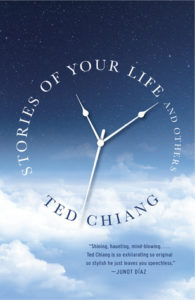Thoughts on Stories of Your Life and Others, by Ted Chiang

For the seven years this blog has been in existence, I’ve posted year-end lists of outstanding books that I heartily recommend (books in addition to my own, of course). The latest such list went live in December, and normally I would move on to some other topic at this point.
However, I’ve now (belatedly) discovered a very smart, insightful, and daring author named Ted Chiang. Several years ago he wrote a collection of stories that resemble one another only in that each presents a world mostly recognizable as our own, except for some fundamental difference.
My favorite has to be “Hell Is the Absence of God,” which depicts a very familiar world and culture except for the fact that it receives rather frequent, and very dramatic, angelic visitations. Whenever an angel shows up, some of the people present receive divine healings (cancers erased, missing limbs restored, etc.) but other bystanders are killed—subsequently visibly ascending to heaven, or going to the other place. (Property damage, when it occurs, is “excluded by private insurance companies due to the cause.”) Blessings are dispensed or withheld with no apparent connection as to whether the recipient was devout or deserving.
This is a wonderful exploration of the nature of faith and the age-old question of why bad things happen to good people. I realized near the end that it has no dialogue whatsoever. The telling might be called summary, which usually weakens a narrative. Not so here. It might be better to think of this as a dramatic essay. A typical passage:
“Perhaps, he thought, it’d be better to live in a story where the righteous were rewarded and the sinners were punished, even if the criteria for righteousness and sinfulness eluded him, than to live in a reality where there was no justice at all. It would mean casting himself in the role of sinner, so it was hardly a comforting lie, but it offered one reward …”
Some of the other stories in the collection concern:
- A medical treatment for brain injury that results in vastly heightened performance (think Flowers for Algernon on steroids)
- Another treatment that zaps neural synapses to control seizures or addiction, which is adapted as a means of programming people so they cannot perceive physical attractiveness, and therefore cannot discriminate on that basis. “Lookism” becomes a controversy at colleges, where there is an initiative to subject all students to the procedure, i.e., to block their ability to experience aesthetic reactions.
- An alternate reality in which naming an individual, in a way suggestive of software coding, endows that individual with predetermined qualities. In effect it sounds similar to gene therapy. However, someone immediately seizes upon this capability as a means of controlling human reproduction so as to address “the great fecundity of the lower classes.”
- A linguist called upon to learn the language of an alien lifeform, who applies the new perceptions thereby acquired as a means of coping with personal loss. The telling interleaves two distinct story lines, both in present tense. In one the narrator is talking to her strong-willed daughter and in the other she traces a realization that events occur in more than one dimension. This is the title piece of the collection, and I identify with it so much.
This one’s a standard first-person present-tense narrative told by the patient: “To me, these people seem like children on a playground; I’m amused by their earnestness, and embarrassed to remember myself doing those same things. Their activities are appropriate for them, but I couldn’t bear to participate now…”
This story is told in a series of statements, almost like responses to interview questions, from various students and faculty members arguing on both sides of the debate, e.g., “This prejudice against unattractive people is incredibly pervasive. People do it without even being taught by anyone, which is bad enough, but instead of combating this tendency, modern society actively reinforces it.”
(The tone here suggests the Victorian era, and scientists who might’ve been created by Jules Verne, or maybe it’s steampunk.)
None of the above is very far removed from the reality I inhabit. To some extent, in every story one or more parties want to exploit innovation for purposes that are questionable at best, and that too is believable. Of course, those not supportive of said purposes can also be fallible.
Anyone at all familiar with the issues most important to me (treatments for neurological disability, other potentially life-altering advances, and the confluence of human needs, expectations, and inscrutable grace) will understand why I’m captivated by this. I hope you will be, too. (Incidentally, the collection contains additional stories, and I’m hearing other readers may have different favorites. So this should not be taken as a complete review.)
(According to his bio Ted Chiang is a tech writer. That makes me like him even more. How many of us tech writers have also turned to writing for the outside world?)